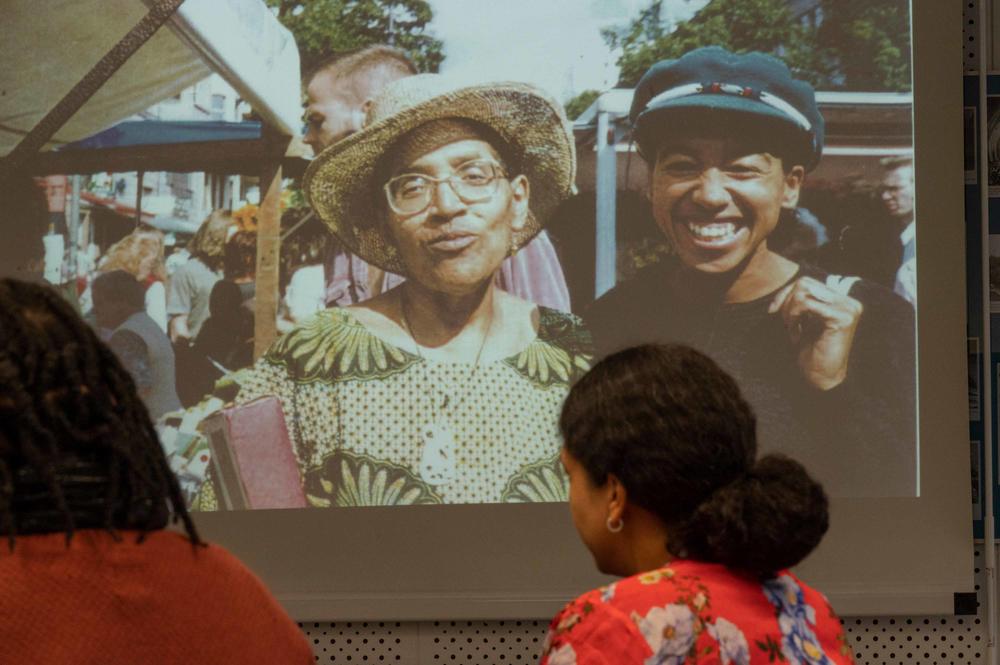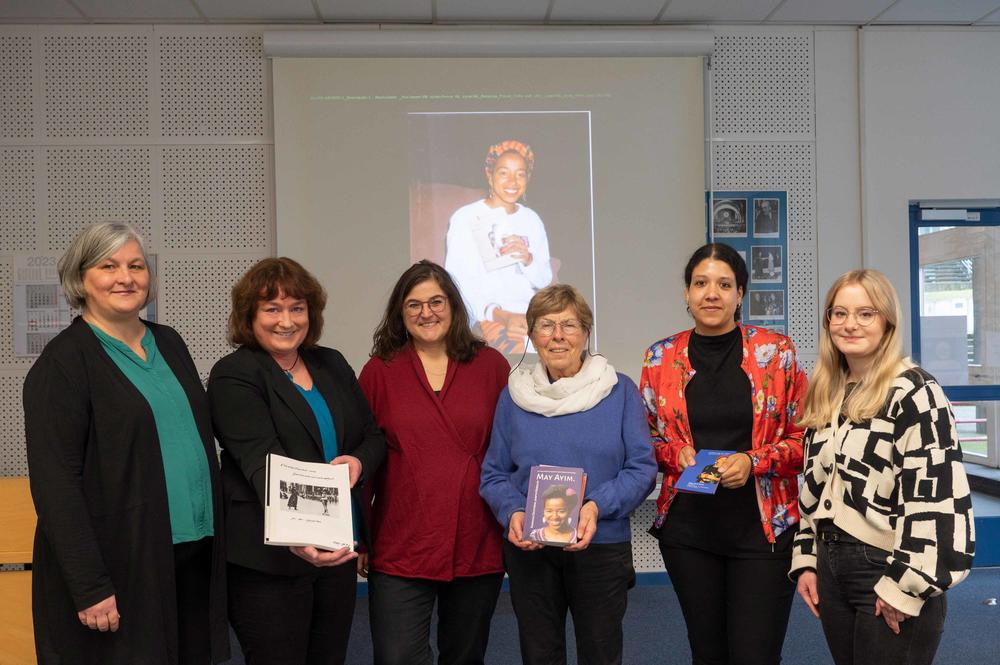An Important Voice in Afro-German Literature
The literary remains of poet, teacher, and activist May Ayim are in the University Archives of Freie Universität Berlin
Apr 26, 2023
May Ayim (at right) met the American writer, scholar, and activist Audre Lorde in West Berlin when Lorde was a visiting professor at Freie Universität Berlin.
Image Credit: Bernd Wannenmacher
Afrodeutsch, or Afro-German, is a term used by many Black people in Germany today to refer to themselves. The term was largely coined by the poet, teacher, and activist May Ayim, who is considered one of the most important voices in the Black community in Germany. Most of her literary remains are accessible to the public in the University Archives of Freie Universität Berlin.
In the 1980s and 1990s Ayim worked repeatedly at Freie Universität. In 1986, for example, she helped design the research focus “Gender Roles and Changing Female Identity” at what was then the Department of Political Science. In 1987 she worked on the project “Identity Formation of Afro-German Women with Consideration of Sociopolitical and Cultural Influences.” During the 1992/1993 winter semester she taught a seminar on “Antiracism – Personal Awareness and Political Education Work” at the Department of Philosophy and Social Sciences I.
Birgit Rehse, head of the University Archives in Berlin-Lankwitz, points out that the holdings in the archive provide a comprehensive overview of Ayim’s personal, scholarly, and literary career. In addition to personal documents including her curriculum vitae, various certificates, private correspondence, and notes taken while she was a student, there are records of her lectures and publications as well as the manuscripts of her poems. The archive also contains documents from the Orlando Frauenverlag, which published works by Ayim, as well as a collection of materials including newspaper and magazine articles, posters, photographs, and obituaries.
Transfer of Ayim’s thesis to University Archives (from left): Matthia Rischke, Susanne Hammer (Principal, Vice Principal, Speech Therapy School); Birgit Rehse, head, University Archives; Prof. Dagmar Schultz; Riccarda J. Schneider; Franziska Schülke
Image Credit: Bernd Wannenmacher
Another important document was recently added to the collection, namely a copy of the thesis Ayim submitted when completing her degree in speech therapy. Entitled “Ethnocentrism and Gender Role Stereotypes in Speech Therapy,” the thesis was donated to Freie Universität in February 2023 by the Speech Therapy School at the Berliner Bildungscampus für Gesundheitsberufe gGmbH (Berlin Education Campus for Health Professions gGmbH). Riccarda J. Schneider, who is a literary scholar and historian specializing in research on Afro-German history, had located the document. Schneider says that Ayim dealt with language in many different ways.
May Ayim Taught at Freie Universität
May Ayim was born in 1960 in Hamburg as the daughter of a German mother and a Ghanaian father. In 1984 she moved to West Berlin, where she met Audre Lorde, an important American writer, scholar, and activist. At the time Lorde held a visiting professorship at Freie Universität Berlin. In the following years Ayim increasingly published poems in addition to her scholarly work. She started training as a speech therapist and also taught a class at Freie Universität. She was a cofounder of the nonprofit organization, Initiative Schwarze Menschen in Deutschland (Initiative of Black People in Germany, ISD). Together with Katharina Oguntoye and Dagmar Schultz she published the volume Farbe bekennen. Afro-deutsche Frauen auf den Spuren ihrer Geschichte. It was the first scholarly study of Afro-German history and is now considered a standard work on the subject. The book was translated and published in English as Showing Our Colors: Afro-German Women Speak Out (1986). In 1996 at the age of 36, Ayim committed suicide during a bout with depression.
After Ayim’s death, sociologist and filmmaker Dagmar Schultz was the executor of Ayim’s literary estate. In 2015 Schultz donated the literary remains to Freie Universität. Following extensive preparation, the documents are now accessible to the public. The part of Audre Lorde’s literary estate from her “Berlin Years” is also available in the University Archives. These materials include audio recordings of the three seminars Lorde gave at Freie Universität in the 1980s. Rehse says that many people seek access to the literary remains of May Ayim and Audre Lorde in the University Archives, as they contain important documents of Black history in Germany.
The original German version of this article appeared in campus.leben, the online magazine published by Freie Universität Berlin.


